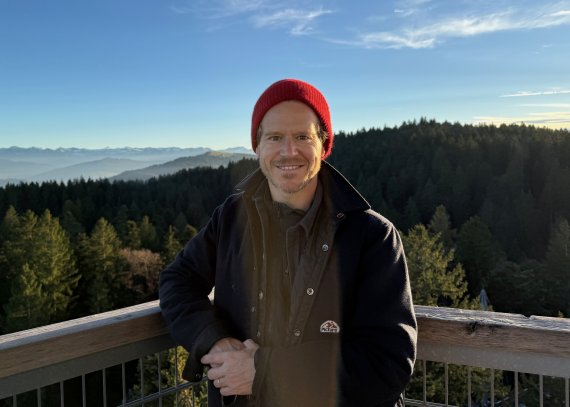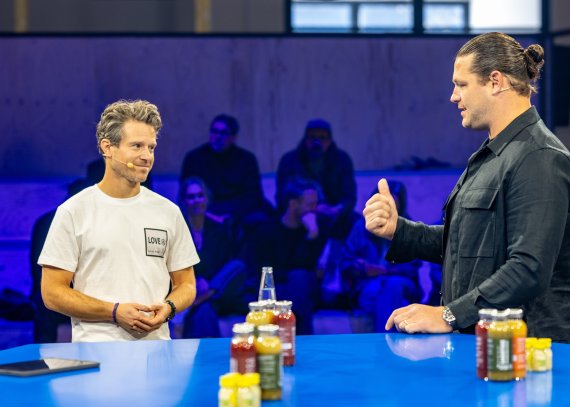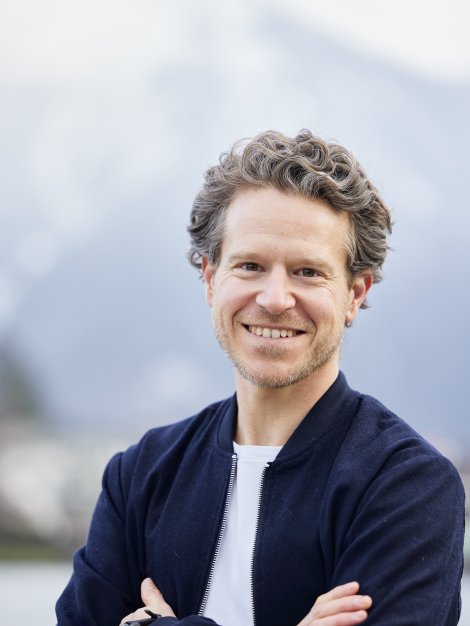Save the Date:
🎤 Panel Talk: An Athlete's Mindset: Three Perspectives on Lasting Success
👥 Speaker: Philipp Boy • Lina Magull • Paul Schif
📍 Location: House of Content
🗓️ Date: November 30, 2025
⏰ Time: 11:15-12:15
ISPO.com: Paul, what role has the sport played in your own life and how has it shaped you personally and professionally?
Paul Schif: I actively snowboarded and can say without exaggeration that I owe who I am today and where I am today to the sport. As a child, I was rather shy and reserved. Snowboarding brought me into contact with very different people, I learned to test my limits again and again and gained self-confidence step by step.
The sport showed me that development is never a straight line - you fall, get up again and get better with every experience. This attitude still shapes me today, both privately and professionally. And this time has resulted in a network that has developed organically and that I draw on every day. It is certainly one of my most important assets, not only for professional success, but also for inspiration and perspective.
Who or what inspired you to create a bridge between sport and business?
Paul: I've always been fascinated by how sport brings people together and creates connections in its own unique way. When you meet in a traditional business setting, it often remains formal and controlled, with everyone maintaining their role. In sport, on the other hand, you can't hide behind anything. It's not about how good you are, but about being honest, present and open. This is exactly what creates relationships that go deeper and can also lead to real joint success in a professional context
I realized this as a student when I applied for my first internship. The initial contact for my internship at adidas came through personal contacts from the world of sport. That was the first time I experienced how powerful the unifying force of sport can be in professional life.
I then really understood what the "Power of Sport" really means as Managing Director of the Laureus Sport for Good Foundation. There is probably no other organization where sport and business work so closely together to shape social change. Incidentally, the founding of Laureus Sport for Good was inspired by none other than Nelson Mandela, who was the first patron of the first Laureus World Sports Awards in 2000 and said: "Sport has the power to change the world. It has the power to inspire. It has the power to unite people in a way that little else does." This conviction remains with me to this day and is ultimately the core of what we want to carry forward with the Athletes Alliance.

What values are central to the Athletes Alliance, and what values should companies and athletes have in order to be good partners?
Paul: The most important value for the Athletes Alliance and for our partners is trust. You learn trust in sport and that's exactly what we've built the Athletes Alliance on. Miki Martin, Markus Kuhn and I know from our own experience that performance in sport only works if you can rely on others, take responsibility and get up again after setbacks. If you want to achieve big goals, you need team spirit, discipline and perseverance. In our view, there is no better school of life than sport.
These values can be transferred directly to business. With the Athletes Alliance, we are creating a platform that combines both: a unique pool of talent with a sporting mindset and a growing network of companies that are looking for precisely these qualities. In times of the "war for talent", i.e. increasing competition for qualified specialists, athletes are increasingly in demand as employees, brand ambassadors and managers.
Companies need to adapt their strategies in order to survive the competition for the best minds. This includes active recruiting, a strong employer brand, genuine development opportunities and working conditions that promote flexibility and appreciation. In all of these areas, we see the Athletes Alliance as a sparring partner that builds bridges - between people with attitude and companies with ambitions for the future.
What challenges do you face as Athletes Alliance when supporting athletes and building networks between athletes and companies?
Paul: The biggest challenge is that many decision-makers, especially in the HR sector, do not yet recognize experience from professional sport as real professional experience. Yet athletes bring with them over the years exactly what is needed in business: discipline, resilience, motivation and the ability to work in a team. There are numerous examples of successful careers of former professional athletes in the business world. Scientific studies, such as "Kollege Spitzensportler" by Professor Sascha Schmidt, also prove the potential of these talented individuals and their high potential for a second career.
We see a further challenge on the part of the athletes themselves. Many underestimate how important networks are for their professional integration, even though they have the best prerequisites for this through sport. Those who have had to rely on others in sport, build trust and achieve goals together have exactly the mindset that is valued in business.
This is exactly where we come in with the Athletes Alliance. We create structures in which athletes can recognize their strengths, develop them in a targeted manner and come into contact with the right companies.

Which athletes benefit most from your work? Are there any profiles that are particularly interesting for companies?
Paul: Basically, all athletes who want to actively shape the transition from competitive sport to business will benefit. Especially those who have learned to constantly adapt to new goals, teams and environments. In other words, typical top performers with a high degree of self-control, feedback skills and resilience.
We do not see a pattern according to sports, but according to skills and attitude: those who have internalized discipline, perseverance, team spirit and personal responsibility in sport have the ideal prerequisites to quickly make an impact in dynamic companies.
The key success factors for a second successful career for former professional athletes are the respective network and early career planning, not the type of sport. With the Athletes Alliance, we focus on these success factors and support all athletes who want to take the next step towards a successful second career with us. Regardless of which sport they come from.
What added value do former athletes bring to companies?
Paul: Former top athletes bring an extraordinary combination of motivation, goal orientation and team spirit. Many have learned over the years how to deal with pressure, analyze setbacks and continuously develop themselves. Skills that are often crucial in business, but are rarely practiced so consistently. They think in cycles, plan for the long term, but react quickly and remain focused.
This mindset is also transferred to teams and projects. Companies therefore value them not only as employees with a high level of self-motivation and willingness to learn, but also as credible brand ambassadors or partners both externally and internally, for example in transformation processes.
Many athletes report an identity hole after their career. What are the biggest hurdles?
Paul: The biggest hurdle is the sudden loss of structure, meaning and belonging. Everything is clearly defined in sport: Goals, training rhythm, performance feedback, team environment. When you end your career, this framework often disappears overnight and with it a large part of your own identity.
Many athletes have learned over the years to subordinate everything to success. After their career, they have to reorient themselves: Who am I without the next season, without a competition, without a medal? At the same time, they often lack professional networks and experience outside of sport.
What's more: In sport, failure is part of the system; in business, it is often perceived differently. Dealing with this new form of evaluation, with hierarchies or uncertainties, is a challenge for many.
That's why it's so important for athletes to start building up their second pillar early on. Not just after the last competition.
This is exactly where we come in with Athletes Alliance: We create the space and structure for athletes to recognize their strengths, transfer them to new contexts and develop a clear perspective.
What lessons can companies learn from this when integrating new talent?
Paul: Top-class sport shows very clearly that development takes time, trust and a clear role. No talent becomes a leader if they are only measured by results. The decisive factor is whether someone is allowed to grow.
Companies can learn a lot from this attitude: anyone integrating new talent should focus less on perfection and existing hard skills and more on potential and the ability to learn. In sport, an environment is created that challenges but also encourages. With honest feedback, clear goals and a culture in which mistakes are seen as part of progress.
Sport also shows how important team dynamics and identification are. Athletes do not function in isolation, but in systems that create meaning. Companies that embrace this idea create loyalty and motivation. Especially among the younger generation, who value purpose and development more than status or titles.
Ultimately, it's about a shared attitude: performance is created where people feel seen, challenged and valued, whether in sport or in the company.
You talk about the "athlete mindset". Which characteristics are particularly transferable and where do we perhaps need to rethink?
Paul: The "athletes mindset" describes the inner attitude with which competitive athletes approach challenges. Many of these principles are directly transferable: Clarity of purpose, discipline, dealing with setbacks, a focus on continuous improvement and the ability to perform under pressure.
What companies particularly appreciate is the consistency with which athletes take responsibility. For themselves, their team and the result. They think in terms of processes, not excuses, and they have learned not to take feedback personally, but to use it as a tool for further development.
At the same time, athletes in business need to rethink their approach in some areas. While sport is strongly focused on short-term performance, clear hierarchies and measurable results, the corporate world often requires more patience, cooperation across departmental boundaries and the courage to lead without complete control.
In our work with athletes, we repeatedly find that they have enormous self-confidence in their sport, but often lose this self-image as soon as they enter new territory, for example in a job outside of sport. Yet they should still be confident! In many crucial areas like mental strength, dealing with pressure, team dynamics, self-discipline, they have more experience than many of their peers in the business world. This is exactly what we teach the athletes we work with.
The "athletes mindset" is therefore not a ready-made recipe for success, but a strong foundation that can be supplemented by new perspectives, such as empathy, strategic thinking or dealing with uncertainty. When an athletic mindset and entrepreneurial thinking come together, the result is an extraordinary lever for personal and organizational development.
Last year, you held your first open forum at ISPO in Munich. What experiences and insights did you gain from it?
Paul: The response was overwhelming. The great interest shown by companies in our approach showed us that we started at the right time and in the right place with the Athletes Alliance. Many decision-makers from the business world have recognized the potential that athletes have. Not only as brand ambassadors, but above all as future leaders, innovators and team players with exceptional mental strength.
ISPO has clearly shown us how strong our network has become and how important it is to bring athletes and companies together in a targeted manner. The economy, sport and ultimately our society need these talents now more than ever to remain sustainable and successful.
For us, the forum was a clear signal: the demand for people with attitude, resilience and motivation is growing. And that's exactly what athletes bring to the table. That's why we now want to really step on the gas and continue to scale our platform - in Germany and beyond.
You are taking part again this year. What motivated you to take part again and what expectations do you have?
Paul: The decision to take part again was absolutely clear to us. ISPO is the ideal platform to consistently expand our network and to understand which skills and profiles are currently in particular demand in a direct exchange with decision-makers from companies. This feedback is extremely valuable for us in order to prepare athletes specifically for their second career.
This year, we are going one step further: in addition to public panels, we are also offering closed formats in which athletes can make contact with companies in a protected environment and develop their skills in discussions with mentors. This creates closeness, trust and real connectivity - exactly what is needed for successful transitions between sport and business.
Our goal is to use ISPO as a catalyst: for new collaborations, exciting career paths and long-term partnerships between business and athletes.
What role do networks and platforms like Athletes Alliance and ISPO play for the sports industry and how do you see the market developing in the future?
Paul: Networks and platforms like the Athletes Alliance and ISPO are playing an increasingly central role because they bring together people, ideas and opportunities that often used to exist side by side. Sport is increasingly being seen as part of the economy, education and social development and it is precisely at these interfaces that the most exciting innovations are emerging.
For athletes, such platforms are an opportunity to think outside the box, discover new roles and network at an early stage. For companies, on the other hand, they provide access to exceptional talent with clear values, leadership qualities and a genuine desire to perform.
I am convinced that the market will develop significantly over the next few years, away from pure sponsorship logic and towards genuine partnerships on an equal footing. Sport will be seen even more strongly as a driver of development for people and organizations. Networks such as the Athletes Alliance can act as bridge builders here - between sport, business and society.

If you could only give three top tips for athletes just starting their second career, what would they be?
Firstly: Use your network and actively expand it. In sport, performance counts; in business, visibility counts too. Talk about your goals, seek out exchanges with people outside your usual environment and don't be afraid to ask for advice. Good networks are created through openness, not perfection.
Secondly: train your head just as consistently as your body. Continuing education, curiosity and consciously thinking about new topics are crucial to transferring your experience from sport to other contexts. If you are willing to learn, you will quickly become adaptable, regardless of your CV.
Thirdly: Stay confident. Many athletes underestimate how much they can really do. The discipline, goal orientation, teamwork and mental strength you have built up in sport are worth their weight in gold in business. This experience is not a gap in your CV, but a real competitive advantage - you just have to recognize it as such yourself.
If you think back, what is your favorite example of an athlete creating a real business impact?
Paul: A great example for me is Thomas Rohregger. He was a professional cyclist, realized early on that sporting success alone was not enough and therefore studied business administration and law. After finishing his career, he very consciously took the step into business, started in management consultancy and developed the professional depth and strategic perspective that he benefits from today as Vice President Brand & Global Partnerships at Lidl.
It is impressive that Thomas only entered the business world at the age of 30 and yet has come a long way in a very short space of time. This shows very clearly that it is not the number of years in a career that determines success, but attitude, the ability to learn and the willingness to take on responsibility.
His path is an example of what happens when the "athlete's mindset" meets the right skills. Discipline, resilience and goal orientation from sport, combined with analytical thinking and business understanding. This is a mixture that is incredibly effective in companies.
Thomas is now 43 and well into his second career, proving that athletes who want to develop further do not have a lack of experience, but a head start in attitude and focus.
It is clear from the interview with Paul Schif that discipline, team spirit and resilience from sport are directly transferable to business. The Athletes Alliance supports athletes in their transition to work and promotes long-term partnerships between sport and business.
At ISPO 2025, Paul Schif will give insights into how athletes are prepared for their second career and how companies benefit from their mindset - with a focus on mentoring, networks and trustworthy contacts.
Save the Date:
🎤 Panel Talk: An Athlete's Mindset: Three Perspectives on Lasting Success
👥 Speaker: Philipp Boy • Lina Magull • Paul Schif
📍 Location: House of Content
🗓️ Date: November 30, 2025
⏰ Time: 11:15-12:15
- Athletes mindset: Athletes bring clarity of purpose, discipline, resilience and team spirit. Skills that are directly valuable in companies.
- Trust & cooperation: Success comes from reliability and responsibility; these values connect athletes and companies alike.
- Networks & mentoring: Establishing contacts early on and targeted support facilitate the successful transition from competitive sport to business.
- Early career planning: Thinking about your second mainstay during your sporting career minimizes loss of identity and creates prospects for the future.
- Opportunities for companies: Former athletes offer companies an exceptional mindset, leadership potential and motivation. As employees, brand ambassadors or project partners.

 Sports BusinessSki Mountaineering Goes Olympic: What Milano-Cortina 2026 Means
Sports BusinessSki Mountaineering Goes Olympic: What Milano-Cortina 2026 Means
- ISPO awards
- Mountain sports
- Bike
- Design
- Retail
- Fitness
- Health
- ISPO Job Market
- ISPO Munich
- ISPO Shanghai
- Running
- Brands
- Sustainability
- Olympia
- OutDoor
- Promotion
- Sports Business
- ISPO Textrends
- Triathlon
- Water sports
- Winter sports
- eSports
- SportsTech
- OutDoor by ISPO
- Heroes
- Transformation
- Sport Fashion
- Urban Culture
- Challenges of a CEO
- Trade fairs
- Sports
- Find the Balance
- Product reviews
- Newsletter Exclusive Area
- Magazine



